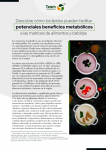UK moves one step closer to ban on trans fats
banning of trans fatty acids by asking the Food Standards Agency
(FSA) for its urgent advice.
A board meeting was held yesterday to seek the views of members of the food industry, consumer groups and industry regulators after health secretary Alan Johnson asked for the agency's recommendations on whether trans fatty acids should be restricted in the UK.
The agency will also get the opinions of the FSA's scientific advisory committee on nutrition, and will discuss the issue at board level in December.
Trans fatty acids (TFAs) are found naturally in dairy and meats, but the vast majority are formed during the partial hydrogenation of vegetable oil that converts the oil into semi-solids for a variety of food applications.
They are extremely useful to the food industry because they extend shelf life and assist flavour stability in processed foods.
However, there is increasing concern about the consumption of TFAs because of the related health risks.
They have been linked to bad cholesterol in the blood and are associated with clogging of the arteries and an increased risk of coronary heart disease.
The recommended daily allowance of TFAs from vegetable origin in the EU is currently 2 per cent.
Johnson has requested advice on the available evidence on the health impact of TFAs and on options for unilateral action to restrict them in foods, covering voluntary and legislative actions, and the associated legal implications.
He has also asked for an international comparison, both in terms of TFA intakes and actions taken as well as other relevant considerations with respect to food reformulation and alternatives to TFAs.
Up to now, cutting down on fatty acids in the UK has been on a purely voluntary basis, with some companies willingly making important changes.
Earlier this year, Sainsbury's became the first major retailer to announce plans to ban trans fat from all their own brand foods.
This action was followed by similar pledges other large retailers.
Some other countries have taken more significant steps in their control.
Denmark introduced legislation in 2004 that required locally and imported foods to contain less that 2 per cent TFAs, effectively abolishing the use of partially hydrogenated vegetable oils in the country.
This year New York City banned restaurants from using them.
Other cities, such as Boston and Chicago, are considering taking similar measures.
Johnson has asked the Agency for a rapid response in this pressing issue, providing its advice by December 19.
Banning the use of TFAs would have a huge impact on the food industry, requiring massive food reformulation.
A survey carried out by the Food and Drink Federation this summer showed that the UK food industry has already committed itself to much food reformulation in the fight against obesity.
Results showed that the recipes for at least £15bn (€21.5bn) worth of foods have less fat, sugar and salt, compared with 2004.
In addition, a further £11.5bn (€16.5bn) worth of products that are lower in these ingredients have been launched.













